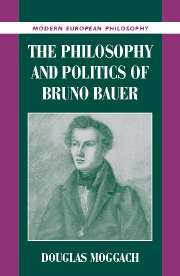Book contents
- Frontmatter
- Contents
- Preface
- THE PHILOSOPHY AND POLITICS OF BRUNO BAUER
- Introduction: “The Friend of Freedom”
- I FOUNDATIONS: AESTHETICS, ETHICS, AND REPUBLICANISM
- II JUDGING THE OLD ORDER
- III THE EMANCIPATORY PROJECT
- 5 “Only the Ought Is True”: Hegel, Self-Consciousness, and Revolution
- 6 “To the People Belongs the Future”: Universal Right and History
- IV JUDGING THE REVOLUTIONARY MOVEMENT
- Epilogue: After the Revolution: The Conclusion of the Christian-Germanic Age
- Appendix: Bruno Bauer, “On the Principles of the Beautiful” (1829)
- Notes
- Bibliography
- Index
5 - “Only the Ought Is True”: Hegel, Self-Consciousness, and Revolution
Published online by Cambridge University Press: 05 June 2012
- Frontmatter
- Contents
- Preface
- THE PHILOSOPHY AND POLITICS OF BRUNO BAUER
- Introduction: “The Friend of Freedom”
- I FOUNDATIONS: AESTHETICS, ETHICS, AND REPUBLICANISM
- II JUDGING THE OLD ORDER
- III THE EMANCIPATORY PROJECT
- 5 “Only the Ought Is True”: Hegel, Self-Consciousness, and Revolution
- 6 “To the People Belongs the Future”: Universal Right and History
- IV JUDGING THE REVOLUTIONARY MOVEMENT
- Epilogue: After the Revolution: The Conclusion of the Christian-Germanic Age
- Appendix: Bruno Bauer, “On the Principles of the Beautiful” (1829)
- Notes
- Bibliography
- Index
Summary
Among Bauer's numerous texts of 1841, Die Posaune des jüngsten Gerichts über Hegel, den Atheisten und Antichristen (The Trumpet of the Last Judgement upon Hegel, the Atheist and Antichrist) is the most significant formulation of the ethic of historical perfectionism, and of its relation to the Hegelian system. It applies this ethic in defence of the revolutionary task of the present. The doctrine of infinite self-consciousness defines the relation of subjectivity to the world as an affirmation of human freedom against all transcendent powers. It asserts the claim to the conscious reshaping of the self, the state, and society, in the light of universal purposes. These purposes are now conceivable in their generality and scope because of the progress of history and philosophy, securing the vantage point from which the present may be submitted to apodeictic judgement and criticism. The experience and limits of the French Revolution, and the systematic achievements of Hegel, open new horizons for an enlarged Sittlichkeit and authentic individual autonomy. Bauer's text outlines a political programme, the critique of the church, the existing state, and conciliatory liberalism, in the interests of republican transformation, with constant reference to the Jacobin example. In describing the ethics of the revolutionary process, the text stresses the principled and ruthless critique of all existing relations; the refusal to compromise; the need to provoke escalation of conflict in order to generate a clean and decisive break between opposed principles, culminating in the revolutionary overthrow of the old order.
- Type
- Chapter
- Information
- The Philosophy and Politics of Bruno Bauer , pp. 99 - 118Publisher: Cambridge University PressPrint publication year: 2003



